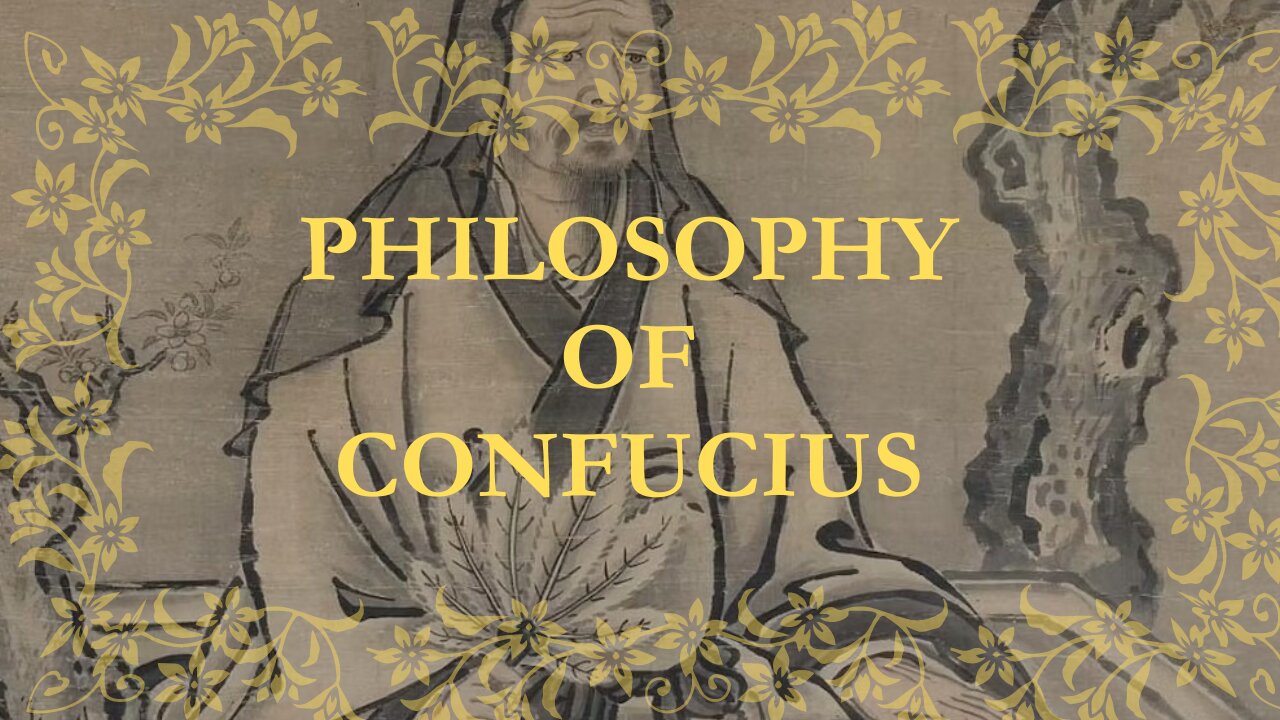Premium Only Content

Confucius | 3-Minute Philosophy | Peak Intrigue #philosophy #Confucius #confucianism
Today, we will be discussing the philosophy and views of one of the most influential philosophers in Chinese history, Confucius. Confucius was born in 551 BCE in Qufu, a small town in the state of Lu, which is now modern-day Shandong Province, China. He lived during the Eastern Zhou dynasty, a time of political and social turmoil, where different states were vying for power and influence. As a young man, Confucius worked as a government official, but he eventually became disillusioned with the political climate of the time and turned to teaching. He traveled throughout China, offering his teachings to anyone who would listen. Confucius's philosophy was based on the belief that society could only function properly if everyone acted with moral integrity and a sense of duty to their fellow citizens. He believed that people should be guided by principles of virtue and ethical behavior, and that the key to a harmonious society was the cultivation of personal and societal virtues. Confucius wrote several books, the most important of which is the Analects. The Analects is a collection of sayings and teachings attributed to Confucius and his disciples, and it remains one of the most influential texts in Chinese philosophy. One of the central concepts in Confucian philosophy is the idea of the "Junzi," or the "gentleman" or "noble person." The Junzi is someone who embodies the highest virtues and acts with integrity and wisdom. Confucius believed that everyone had the potential to become a Junzi, and that it was the responsibility of society to cultivate these virtues in its citizens. Confucius also emphasized the importance of education in the cultivation of virtue. He believed that education should be accessible to all, regardless of social status or wealth. He believed that education should focus on moral and ethical principles, rather than just intellectual knowledge. In addition to his teachings on virtue and education, Confucius also had a strong sense of social justice. He believed that rulers should be chosen based on their moral character and their ability to lead, rather than their wealth or social status. He also believed that rulers had a responsibility to serve their people, and that they should be held accountable for their actions. Despite his widespread influence and teachings, Confucius was not widely recognized during his lifetime. It wasn't until several centuries after his death that his teachings gained widespread acceptance in China. Today, Confucianism remains one of the most important philosophical and ethical systems in Chinese culture. One of Confucius's greatest achievements was his influence on Chinese culture and society. His teachings shaped the way that people thought about ethics, morality, and social organization. Confucianism became the dominant philosophy in China for centuries, and its influence can still be felt today. Another of Confucius's achievements was the development of a system of education that was accessible to all. He believed that education was the key to personal and societal transformation, and his ideas about education continue to shape Chinese culture and society to this day. Confucius died in 479 BCE, at the age of 72. His legacy lived on, however, and his teachings continue to inspire and influence people all over the world. His philosophy emphasizes the importance of moral integrity, social justice, and education, and it remains a powerful force in Chinese culture and beyond. In conclusion, Confucius was one of the most influential philosophers in Chinese history. His teachings on virtue, education, and social justice continue to shape Chinese culture and society to this day. Although he was not widely recognized during his lifetime, his legacy lives on, and his ideas continue to inspire people all over the world. #confucius #confucianism #philosophy #peakintrigue #introduction #3minutephilosophy
-
 1:45:26
1:45:26
Kim Iversen
13 hours agoBANNED for Telling the Truth: The 9/11 and Epstein Plot They Don't Want You To Hear
141K188 -
 1:08:47
1:08:47
Man in America
15 hours agoDr. Makis EXPOSES Big Pharma’s SICK Vaccine Scam—RFK Jr. Must Act NOW!
113K36 -
 1:28:21
1:28:21
Glenn Greenwald
14 hours agoRFK Jr. Hearing Reveals DC Pro-Pharma Consensus; Trump's Executive Order to Deport Student Protesters Criticizing Israel; Untangling DC Think Tank Funding & Influence | SYSTEM UPDATE #399
158K174 -
 1:23:44
1:23:44
Space Ice
14 hours agoSpace Ice & Redeye: Van Damme's The Quest: Pirates, Clowns, James Bond & Bloodsport
52.4K3 -
 59:57
59:57
The StoneZONE with Roger Stone
12 hours agoJ6 Martyr Enrique Tarrio Describes Inhumane Prison Conditions Ordered by Biden | The StoneZONE
50.6K4 -
 16:48
16:48
Tundra Tactical
11 hours ago $11.42 earnedAffordable Medical Gear From ACETAC SHOT Show 2025
98.3K5 -
 1:46:16
1:46:16
Redacted News
15 hours agoRFK CONFIRMATION: Kennedy goes to WAR with Big Pharma Democrats in Fiery Hearing | Redacted Live
273K437 -
 57:31
57:31
Candace Show Podcast
15 hours agoBREAKING! Taylor Swift Turns Against Blake Lively & Ryan Reynolds | Candace Ep 141
247K180 -
 1:04:59
1:04:59
Sarah Westall
12 hours agoRFK Jr Report, Constitution Suspended, War Time Procedures in Place, WHO Exit, DOD w/ Sasha Latypova
85.1K50 -
 1:56:37
1:56:37
Melonie Mac
16 hours agoGo Boom Live Ep 35!
72.3K15